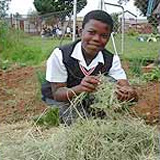Permaculture is short for permanent agriculture. It involves the design and maintenance of sustainable, ecologically sound, energy-efficient agricultural and horticultural systems. It’s a radical approach to food production particularly in the context of an increasingly branded, packaged and our quick fix society. And it produces more energy than it uses largely by recycling all nutrients and waste. This, then, reduces carbon emissions and assists in arresting global warming.
In the context of this week’s National Environment Week, initiatives like these may seem small, but significant changes such as sustainable ways of growing our food can make all the difference at a number of levels.
Projects like the EduPlant initiative, a Woolworths Trust social investment project co-ordinated by Food & Trees for Africa, are of this nature. Geared towards making a difference by building food security in a sustainable way within township and rural school communities, it consists essentially of an annual education programme and competition which together reap a whole basket of ongoing community benefits.
It works like this
The trained educators teach the children to design and establish food gardens in the school grounds. That includes setting up recycling, water harvesting, companion planting, creating natural pest-repellents, composting, energy-saving and attracting birds and other useful creatures to their school environment activities all in line with the principles of permaculture. In 2007 EduPlant trained 5430 educators through their attendance at the free April workshops.
Zinzi Mgolodela, Woolworths Trust Trustee said: “Its core tenet is following nature’s natural patterns. The harvest is when the harvest has always been, the food that is in season is the food that is eaten and no chemical fertilisers or pesticides are used on the vegetables and fruit grown. In essence, the scheme produces organic foodstuffs on a small scale at community level.”
The benefits
• School environments where waste is managed, water is conserved and soil is enriched are cleaner and healthier.
• The gardens are living, learning laboratories where experiments and lessons can be delivered to meet – Outcomes Based curricula criteria across a number of learning areas.
• The design, nurturing and harvesting of the gardens imparts and revives the traditional life skill of producing one’s own food in harmony with nature.
• Fresh, organic food increases awareness of the positive impact of good nutrition on health, especially with regard to HIV/AIDS.
• The gardens have led to a range of additional outreach projects for instance, teaching other schools, parents and community members how to develop their own permaculture food gardens.
• And it is also fun, encouraging the youth to adopt responsible environmental practices early without the need to force the issue: no need for a big stick when the end product really is a sweet and juicy organic carrot.
To find out more about the Woolworth’s Trust EduPlant schools permaculture programme please go to Woolworths Trust EduPlant 2007
* (1.5m South African children aged 1-9 suffer from malnutrition: the National Food Consumption Survey SA 1999 Vitamin Information Centre, April 2001)

